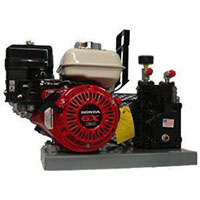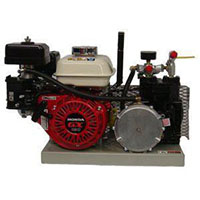| Items |

H50GH
Krug Gas Fueled Engine Vapor Compressor
Price QUOTE
|

H50LPH
Krug Propane Fueled Engine Vapor Compressor
Price QUOTE
|
|
Description
|
N/A
For efficient transfer of butane, propane, or anhydrous ammonia.
|
N/A
For efficient transfer of butane, propane or anhydrous ammonia.
|
|
Capacity
|
N/A
18 to 50 gpm
|
|
Number of Cylinders
|
N/A
2
|
|
Displacement
|
N/A
10.7 in³
|
|
Stroke Size
|
N/A
1.811 in
|
|
Bore Size
|
N/A
1.875 in
|
|
Suction Swivel Pipe
|
N/A
1/2 in
|
|
Discharge Swivel Pipe
|
N/A
1/2 in
|
|
Compressor Preset Rotation
|
N/A
1000 rpm
|
|
Engine Preset Rotation
|
N/A
2800 rpm
|
|
A/B Vee Belt Drive
|
N/A
38 in
|
|
Shipping Weight
|
N/A
70 lb
|
|
Overhead Valve Power
|
N/A
4 hp
|
|
Compressor Specifications
|
N/A
5/8 Pint Oil (SAE 40 non-detergent)
|
|
General Specifications
|
N/A
- 9" x 18" x 11 Gauge Steel Base
- Expanded Metal Belt Guard
- Carrying Handle
|
|
Engine Specifications
|
N/A
- Shaft Lauson Engine
- Spark Arresting Muffler
- Shielded Electronic Ignition
- On/Off Switch
|
|
Alternate Part Number
|
N/A
H50GL
|
N/A
|
|
How it Works
|
N/A
The suction side of the compressor draws vapor from the applicator tank into the discharge side of the compressor. This causes a pressure drop in the applicator tank. A pressure drop of 5 to 10 PSI will cause liquid to flow from the field nurse tank into the applicator tank. Care should be taken that the applicator tank is not overfilled, as this could cause oil to flow from the compressor crankcase.
|


